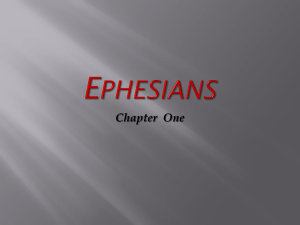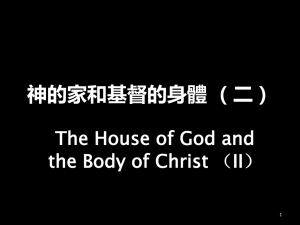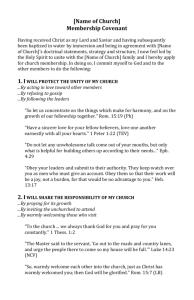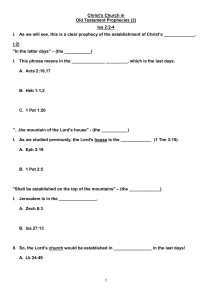Paul's Letter to the Ephesians June 2, 2013
advertisement
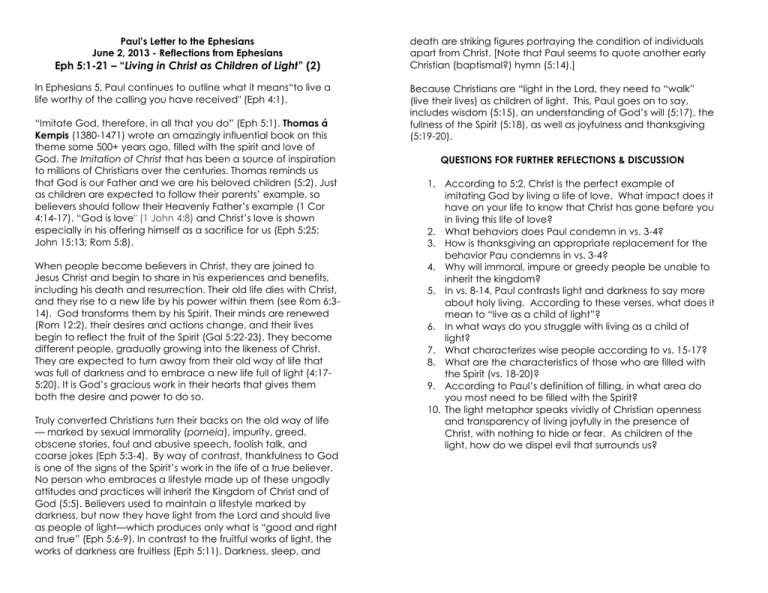
Paul’s Letter to the Ephesians June 2, 2013 - Reflections from Ephesians Eph 5:1-21 – “Living in Christ as Children of Light” (2) In Ephesians 5, Paul continues to outline what it means“to live a life worthy of the calling you have received" (Eph 4:1). “Imitate God, therefore, in all that you do” (Eph 5:1). Thomas á Kempis (1380-1471) wrote an amazingly influential book on this theme some 500+ years ago, filled with the spirit and love of God. The Imitation of Christ that has been a source of inspiration to millions of Christians over the centuries. Thomas reminds us that God is our Father and we are his beloved children (5:2). Just as children are expected to follow their parents’ example, so believers should follow their Heavenly Father’s example (1 Cor 4:14-17). “God is love" (1 John 4:8) and Christ’s love is shown especially in his offering himself as a sacrifice for us (Eph 5:25; John 15:13; Rom 5:8). When people become believers in Christ, they are joined to Jesus Christ and begin to share in his experiences and benefits, including his death and resurrection. Their old life dies with Christ, and they rise to a new life by his power within them (see Rom 6:314). God transforms them by his Spirit. Their minds are renewed (Rom 12:2), their desires and actions change, and their lives begin to reflect the fruit of the Spirit (Gal 5:22-23). They become different people, gradually growing into the likeness of Christ. They are expected to turn away from their old way of life that was full of darkness and to embrace a new life full of light (4:175:20). It is God’s gracious work in their hearts that gives them both the desire and power to do so. Truly converted Christians turn their backs on the old way of life — marked by sexual immorality (porneia), impurity, greed, obscene stories, foul and abusive speech, foolish talk, and coarse jokes (Eph 5:3-4). By way of contrast, thankfulness to God is one of the signs of the Spirit’s work in the life of a true believer. No person who embraces a lifestyle made up of these ungodly attitudes and practices will inherit the Kingdom of Christ and of God (5:5). Believers used to maintain a lifestyle marked by darkness, but now they have light from the Lord and should live as people of light—which produces only what is “good and right and true” (Eph 5:6-9). In contrast to the fruitful works of light, the works of darkness are fruitless (Eph 5:11). Darkness, sleep, and death are striking figures portraying the condition of individuals apart from Christ. [Note that Paul seems to quote another early Christian (baptismal?) hymn (5:14).] Because Christians are “light in the Lord, they need to “walk” (live their lives) as children of light. This, Paul goes on to say, includes wisdom (5:15), an understanding of God’s will (5:17), the fullness of the Spirit (5:18), as well as joyfulness and thanksgiving (5:19-20). QUESTIONS FOR FURTHER REFLECTIONS & DISCUSSION 1. According to 5:2, Christ is the perfect example of imitating God by living a life of love. What impact does it have on your life to know that Christ has gone before you in living this life of love? 2. What behaviors does Paul condemn in vs. 3-4? 3. How is thanksgiving an appropriate replacement for the behavior Pau condemns in vs. 3-4? 4. Why will immoral, impure or greedy people be unable to inherit the kingdom? 5. In vs. 8-14, Paul contrasts light and darkness to say more about holy living. According to these verses, what does it mean to “live as a child of light”? 6. In what ways do you struggle with living as a child of light? 7. What characterizes wise people according to vs. 15-17? 8. What are the characteristics of those who are filled with the Spirit (vs. 18-20)? 9. According to Paul’s definition of filling, in what area do you most need to be filled with the Spirit? 10. The light metaphor speaks vividly of Christian openness and transparency of living joyfully in the presence of Christ, with nothing to hide or fear. As children of the light, how do we dispel evil that surrounds us?

